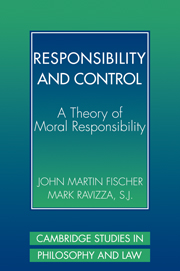Book contents
- Frontmatter
- Contents
- Acknowledgments
- 1 Moral Responsibility: The Concept and the Challenges
- 2 Moral Responsibility for Actions: Weak Reasons-Responsiveness
- 3 Moral Responsibility for Actions: Moderate Reasons-Responsiveness
- 4 Responsibility for Consequences
- 5 Responsibility for Omissions
- 6 The Direct Argument for Incompatibilism
- 7 Responsibility and History
- 8 Taking Responsibility
- 9 Conclusion
- Bibliography
- Index
9 - Conclusion
Published online by Cambridge University Press: 05 June 2012
- Frontmatter
- Contents
- Acknowledgments
- 1 Moral Responsibility: The Concept and the Challenges
- 2 Moral Responsibility for Actions: Weak Reasons-Responsiveness
- 3 Moral Responsibility for Actions: Moderate Reasons-Responsiveness
- 4 Responsibility for Consequences
- 5 Responsibility for Omissions
- 6 The Direct Argument for Incompatibilism
- 7 Responsibility and History
- 8 Taking Responsibility
- 9 Conclusion
- Bibliography
- Index
Summary
In this brief concluding chapter we first wish to present the overall argument of the book in a concise, nontechnical way. We hope this will provide a clear view of the argument. We shall then point to some of the distinctive – and attractive – features of our approach. Finally, we shall offer some preliminary thoughts about extending the account of moral responsibility to apply to emotions.
THE OVERALL ARGUMENT
In presenting the overall argument of the book, we shall tell the story in a relatively simple way, leaving the details and complications aside. Of course, we do not wish in any way to minimize the potential problems and objections, or to suggest that the complications are unimportant. Rather, our goal here is to give a clear, brisk picture of our general account.
The leading idea of our theory of moral responsibility is that responsibility is associated with control. But we contend that there are two distinct kinds of control. Regulative control involves alternative possibilities: it is a kind of dual power of free action. In contrast, guidance control does not, by its nature, involve alternative possibilities. Whereas typically it might be thought that regulative and guidance control go together, the Frankfurt-type cases show that they are separate and distinct sorts of control. And, whereas typically it is thought that moral responsibility requires regulative control, we claim that moral responsibility – for actions, omissions, and consequences – simply requires guidance control.
- Type
- Chapter
- Information
- Responsibility and ControlA Theory of Moral Responsibility, pp. 240 - 260Publisher: Cambridge University PressPrint publication year: 1998
- 1
- Cited by



